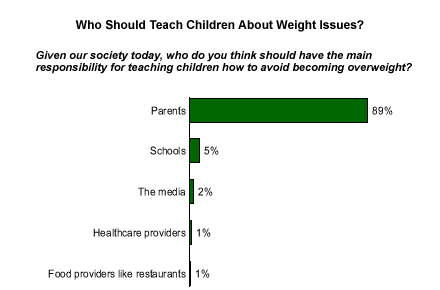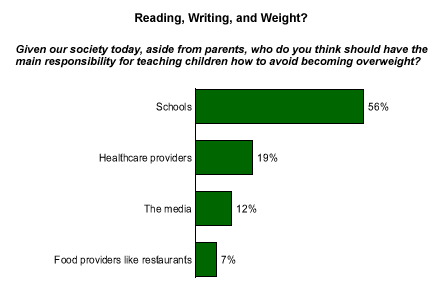A new study confirms what anyone who has walked by a schoolyard or been to a shopping mall lately can plainly see -- many American children are overweight. According to the Federal Interagency Forum on Child and Family Statistics, the rate of overweight children and teens has nearly tripled in 20 years, increasing from 6% in from 1976 to 1980 to 16% from 1999 to 2000. Some of the blame has been placed on schools, where unhealthy lunch choices and vending machines stuffed with soda and candy abound (see "Are Schools Havens for Junk Food Junkies?" in Related Items).
While schools may shoulder some of the burden for the obesity epidemic, there is little question about who Americans think should have the main responsibility for educating children about weight issues. According to Â鶹´«Ã½AV's annual Consumption Habits poll*, 9 in 10 U.S. adults (89%) think parents are responsible for teaching their children how to avoid becoming overweight.

Few Americans --just 5% -- think schools have the main responsibility for educating children about weight issues, and even smaller numbers think it's a job for the media, healthcare providers, or restaurants.
Julie Winberg, a 39-year-old hairdresser from New Jersey, feels that schools should have the main responsibility -- even over parents -- for teaching children how to avoid becoming overweight. "Parents aren't necessarily qualified to teach scientific subjects like good nutrition and weight loss," Winberg says. "Not everyone's metabolism is the same and different children may need different strategies to maintain an ideal weight. And unlike parents, schools can approach the topic from a non-emotional point of view."
Who Else Should Teach Children About Weight Issues?
Given the overwhelming consensus that parents should teach children about how to avoid becoming overweight, Â鶹´«Ã½AV asked the public who, besides parents, should carry that responsibility. The poll finds 56% of Americans saying that responsibility should fall on schools**. Asked what she felt schools should be doing along these lines, Betty Cerutti, a 70-year-old cashier from Ohio, says, "Schools should teach additional nutrition classes and promote group exercise." About one in five Americans (19%) feel that, aside from parents, healthcare providers are the most important sources of education on weight, 12% name the media, and 7% feel that restaurants should teach children about nutrition and weight loss.

Bottom Line
The findings show that, hands down, Americans think parents should be their children's primary teachers about avoiding being overweight. As with the other many lessons parents need to get across to their kids, setting a good example often goes a lot further than charts, graphs, or long lectures.
"Weight education starts at home and setting a good example is the best method," says Heidi Ferman, a 28-year-old Pennsylvania mother. "Parents and kids are so overscheduled these days -- dashing from activity to activity -- that dinner at a fast food restaurant is usually the easiest option. But you have to try to stay away from junk food."
*Results are based on the telephone interviews with –491—National Adults, aged 18+, conducted July 8-11, 2004. For results based on the total sample of National Adults, one can say with 95% confidence that the margin of sampling error is ±5 percentage points.
**Results are based on the telephone interviews with –514—National Adults, aged 18+, conducted July 8-11, 2004. For results based on the total sample of National Adults, one can say with 95% confidence that the margin of sampling error is ±5 percentage points.